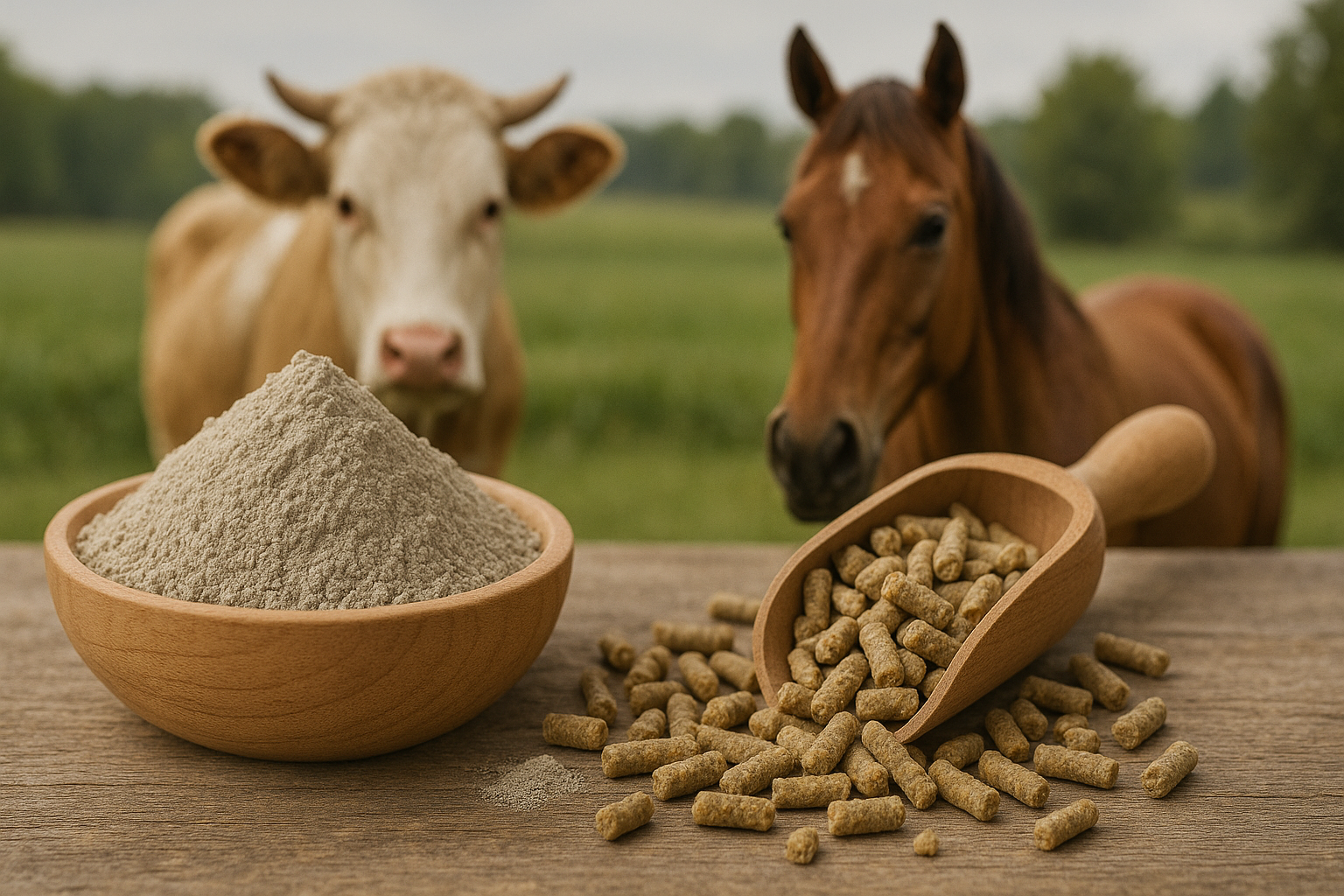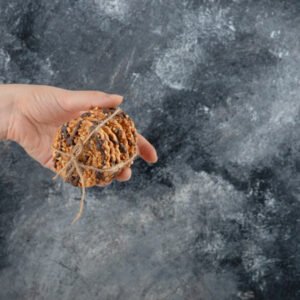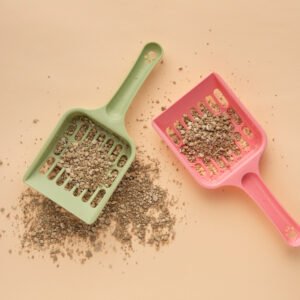The livestock industry constantly seeks natural solutions to improve animal health and feed quality. Bentonite powder has emerged as one of the most valuable feed additives, offering multiple benefits for both animals and farmers. This comprehensive guide explores the proven uses of bentonite powder in animal feed and why it has become essential for modern livestock management.
What is Bentonite Powder?
Bentonite powder is a natural clay mineral formed from weathered volcanic ash. The material consists primarily of montmorillonite, which belongs to the smectite group of clays. This unique composition gives bentonite powder remarkable swelling and absorption properties that make it particularly useful in animal nutrition.
The clay exists in two main forms: sodium bentonite and calcium bentonite. Sodium bentonite exhibits superior swelling capabilities, while calcium bentonite offers better binding properties. Both types find applications in animal feed, depending on specific requirements.
Primary Uses of Bentonite Powder in Animal Feed
1. Mycotoxin Binding Agent
One of the most critical applications of bentonite powder involves mycotoxin control. Diet supplementation with clay minerals, such as bentonite, is a recognized effective method to counteract the toxic effects of mycotoxins in both ruminant and monogastric species. These harmful compounds develop in feed grains during storage and can severely impact animal health.
Bentonite powder works by binding to aflatoxins and other mycotoxins in the digestive system, preventing their absorption into the bloodstream. This protective mechanism helps maintain liver function and supports animal growth rates.
Key benefits include:
- Reduced aflatoxin toxicity in feed
- Protection against liver damage
- Maintained feed conversion ratios
- Improved animal performance
2. Digestive Health Support
Bentonite powder acts as a natural digestive aid by improving gut health and nutrient absorption. The clay’s unique properties help create a favorable environment for beneficial bacteria while reducing harmful pathogens.
Some animal studies show bentonite might boost good bacteria in the gut. This may help with taking in nutrients. The material also helps stabilize pH levels in the digestive tract, creating conditions that support optimal digestion.
3. Natural Detoxification
The detoxification properties of bentonite powder make it valuable for removing various toxins from animal systems. By binding to harmful substances such as bacteria, viruses, heavy metals, and other toxins, sodium bentonite can support the animal’s immune system and overall well-being.
This detoxification process helps:
- Remove heavy metals from feed
- Bind bacterial toxins
- Support immune function
- Reduce oxidative stress
4. Feed Pellet Binding
Bentonite powder serves as an effective binder in pelleted feeds. Its natural binding properties help create stronger, more durable pellets that resist breakage during transport and handling. This reduces feed waste and ensures animals receive consistent nutrition.
The binding action also helps:
- Reduce feed dust
- Improve pellet durability
- Maintain feed quality during storage
- Minimize nutrient segregation
5. pH Buffer and Stabilizer
Clay has all these benefits: It reduces aflatoxin toxicity, works as a pH buffer, and also improves the degradability of some feedstuffs. The buffering capacity of bentonite powder helps maintain stable pH levels in animal digestive systems, particularly important for ruminants.
This pH buffering effect:
- Prevents acidosis in ruminants
- Supports proper rumen function
- Improves fiber digestion
- Maintains optimal microbial activity
6. Anti-Caking Agent
Bentonite powder prevents feed ingredients from clumping together during storage. Its moisture-absorbing properties help maintain feed flowability and prevent the formation of lumps that could affect feed quality.
Benefits as an anti-caking agent:
- Maintains feed flowability
- Prevents moisture-related spoilage
- Reduces storage losses
- Improves feed handling
Read More – 10 Industries That Rely on OCMA DFCP-4 Grade Bentonite
Application Guidelines for Different Animals
Dairy Cattle
For dairy cattle, bentonite powder is typically added at rates of 1-2% of the total diet. This inclusion level provides mycotoxin protection while supporting rumen health and milk production. The clay helps buffer rumen pH during periods of high-grain feeding.
Poultry
In poultry feeds, bentonite powder is commonly used at 0.5-1.5% inclusion rates. Feeding earth (clays) to animals is not new or abnormal. Wild animals always consume a healthy portion of earth alongside their feed, especially those that look for food below ground. For chickens and other birds, bentonite supports digestive health and improves feed conversion efficiency.
Swine
Pig feeds often contain 1-3% bentonite powder, particularly in starter and grower diets. The clay helps prevent scours (diarrhea) in young pigs while supporting overall digestive health.
Aquaculture
Fish feeds benefit from bentonite powder inclusion at 2-5% levels. The clay improves pellet stability in water while providing detoxification benefits for fish health.
Quality Standards and Safety Considerations
When selecting bentonite powder for animal feed applications, quality standards are crucial. Food-grade bentonite must meet specific purity requirements and be free from harmful contaminants.
Quality parameters include:
- Low heavy metal content
- Absence of crystalline silica
- Appropriate particle size distribution
- Consistent moisture content
- Microbiological safety
The EFSA Panel on Additives and Products or Substances used in Animal Feed (FEEDAP) received a request from the European Commission to assess the safety and efficacy of bentonite when used as a feed additive, confirming its regulatory acceptance when properly sourced and applied.
CMS Industries: Your Trusted Bentonite Powder Supplier
CMS Industries stands out as a leading manufacturer and supplier of high-quality bentonite powder specifically designed for animal feed applications. At CMS Industries, we provide high-quality Sodium and Calcium Bentonite, which is processed to manufacture various grades in compliance with the API, Pilling, Earthing Grade, etc.
The company’s animal feed grade bentonite powder undergoes rigorous quality testing to ensure it meets the specific requirements of livestock nutrition. Their expertise in bentonite processing ensures consistent product quality that animal nutritionists can rely on for formulating effective feeds.
What sets CMS Industries apart:
- Comprehensive quality control measures
- Consistent product specifications
- Competitive pricing for bulk quantities
- Technical support for optimal usage
- Reliable supply chain management
Their commitment to quality makes them a preferred choice for feed mills and livestock producers seeking dependable bentonite powder solutions.
Economic Benefits for Producers
The use of bentonite powder in animal feed offers significant economic advantages for livestock producers:
Cost savings through:
- Reduced veterinary expenses due to better animal health
- Improved feed conversion ratios
- Lower mortality rates
- Decreased mycotoxin-related losses
- Better pellet quality reducing waste
Production benefits include:
- Increased milk production in dairy cattle
- Better weight gain in meat animals
- Improved egg production in laying hens
- Enhanced feed efficiency across species
Future Trends and Research
Research continues to explore new applications for bentonite powder in animal nutrition. Current studies focus on:
- Nanotechnology applications in clay minerals
- Enhanced mycotoxin binding capabilities
- Precision nutrition approaches
- Sustainable feed production methods
The growing demand for natural feed additives positions bentonite powder as an increasingly important component in modern animal nutrition strategies.
Conclusion
Bentonite powder has proven itself as a versatile and effective feed additive with multiple benefits for animal health and production. From mycotoxin binding to digestive support, this natural clay mineral addresses many challenges facing modern livestock operations. When sourced from reputable suppliers like CMS Industries and used according to proper guidelines, bentonite powder can significantly improve animal performance while providing economic benefits to producers.
Ready to experience the benefits of high-quality bentonite powder for your animal feed operations? Connect with CMS Industries today to learn more about their feed-grade bentonite products and discover how they can help optimize your livestock nutrition program.
Frequently Asked Questions
Q:1 What is the recommended inclusion rate of bentonite powder in animal feed?
The inclusion rate varies by species: dairy cattle 1-2%, poultry 0.5-1.5%, swine 1-3%, and aquaculture 2-5% of total diet. Always consult with animal nutritionists for specific recommendations based on your operation.
Q:2 Is bentonite powder safe for all animal species?
Yes, food-grade bentonite powder is generally recognized as safe for all animal species when used within recommended inclusion rates. European Food Safety Authority has confirmed its safety and efficacy for animal feed applications.
Q:3 How does bentonite powder help with mycotoxin control?
Bentonite powder binds to mycotoxins like aflatoxins in the digestive tract, preventing their absorption into the bloodstream. This protects animals from mycotoxin toxicity and maintains liver function and overall health.
Q:4 Can bentonite powder improve feed pellet quality?
Yes, bentonite powder acts as a natural binder, creating stronger, more durable pellets that resist breakage. This reduces feed dust, minimizes waste, and ensures consistent nutrient delivery to animals.
Q:5 What quality standards should I look for in feed-grade bentonite powder?
Look for low heavy metal content, absence of crystalline silica, appropriate particle size, consistent moisture levels, and microbiological safety. Choose suppliers with proper quality certifications and testing protocols like CMS Industries.







